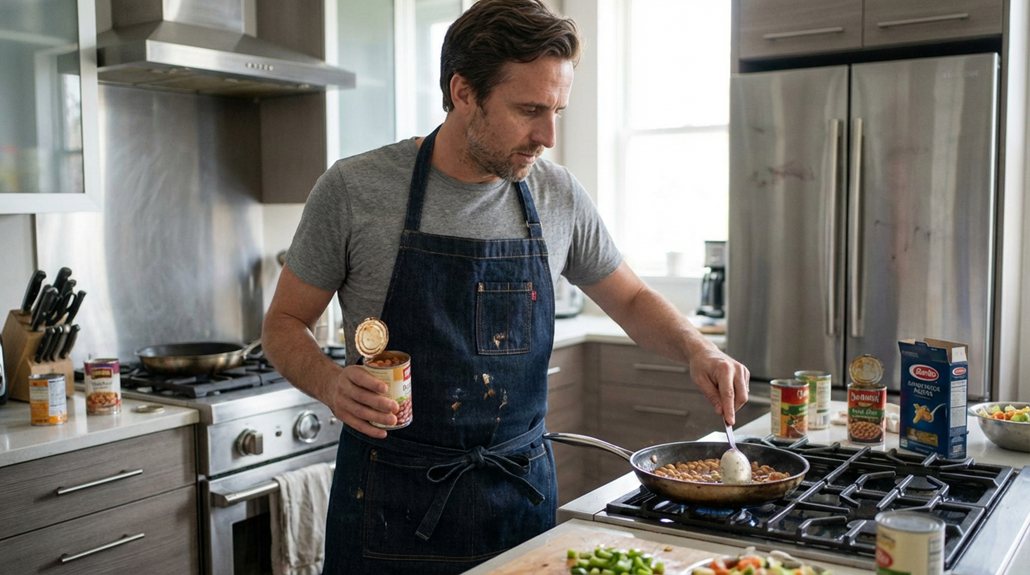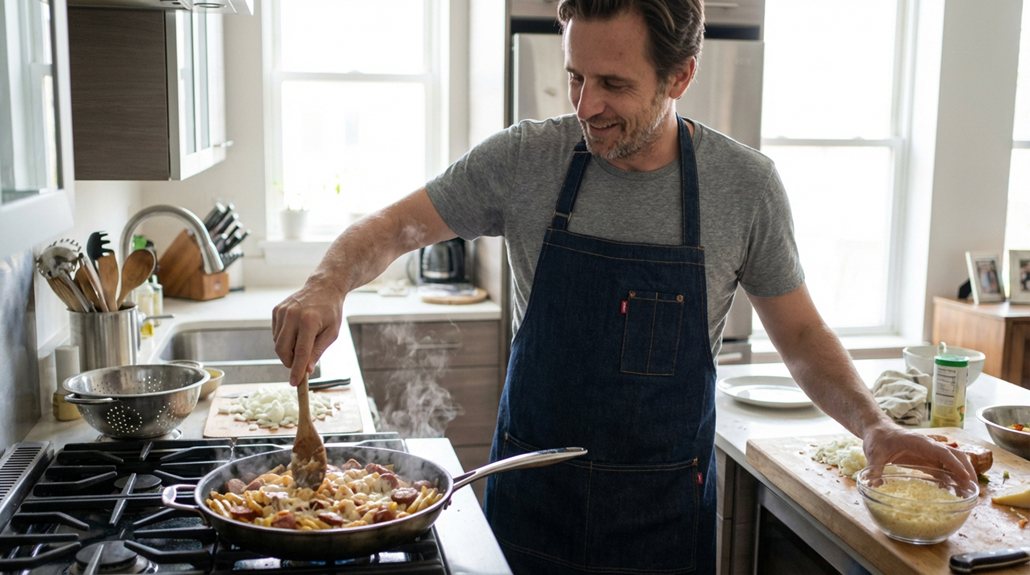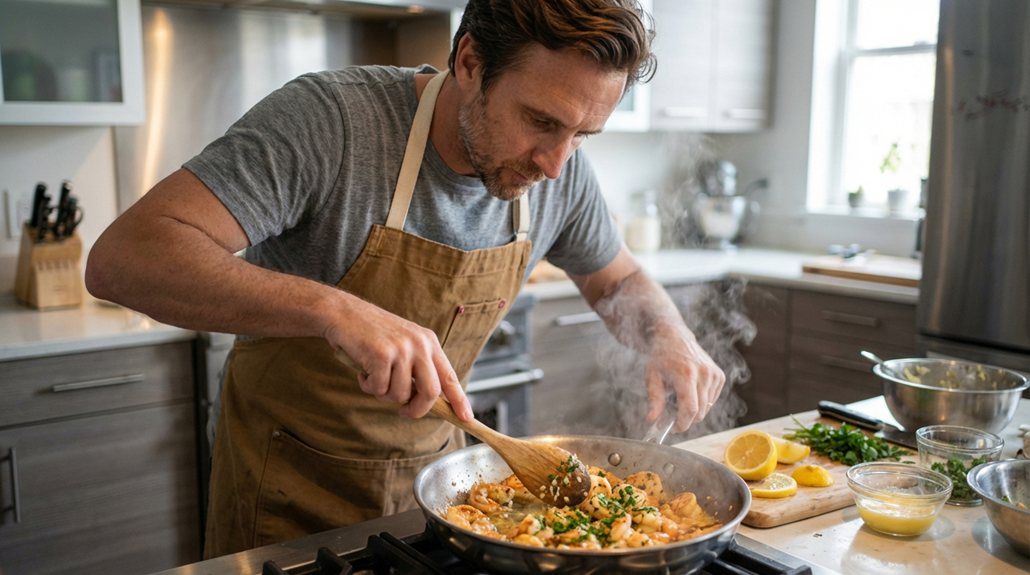Nearly 8 million viewers held their breath as Season 3, Episode 11 of Hell’s Kitchen reached its boiling point. The installment exemplifies the struggle for culinary dominance, with Rock and Bonnie’s leadership styles under the microscope.
They’ve chosen their teams and navigated the pitfalls of restaurant design, and now, they face a dinner service that’s fraught with the potential for disaster. Their decisions reflect not just their skills but also their understanding of freedom within the high-pressure confines of the kitchen.
The episode dissects their strategies, revealing how choices can liberate or constrain a chef under Ramsay’s critical gaze. As service unfolds, the chefs’ adaptability to unforeseen challenges becomes key, showcasing the liberating power of quick thinking in a bind.
This chapter in Hell’s Kitchen history stands as a testament to the freedom found in resilience and the relentless pursuit of excellence.
Key Takeaways from Season 3 Ep 11
- In Hell’s Kitchen American season 3, Bonnie faced challenges with her team not respecting her as a leader.
- Rock’s team struggled with burnt crab cakes and lack of communication
- Bonnie had issues with cold and undercooked pasta dishes during the final service
- Rock was declared the winner based on comment cards and observations
Episode Overview
Day Ten – Hell’s Kitchen (Season 3, Episode 11), the penultimate episode, Rock’s and Bonnie’s leadership skills are tested as they face the challenge of running their kitchens for the first time.
Bonnie’s leadership challenges became evident when her team questioned her authority, highlighting the critical balance between respect and command. Meanwhile, Rock’s impressive cooking skills shone through as he steered his team through service, albeit not without its hurdles.
Both contestants had to navigate the complexities of managing a kitchen brigade, exemplifying that culinary expertise must be matched by unwavering leadership.
Their journey underscored that freedom in the kitchen requires talent and the ability to inspire and direct a team under the most intense pressure.
Team Selection Strategy
The team selection strategy adopted by Bonnie and Rock became critical in the intense showdown of Hell’s Kitchen’s Season 3 Episode 11. Bonnie’s approach relied on the gender-based success her team had experienced, betting on camaraderie to trump skill disparities.
Conversely, Rock’s strategy was a calculated play, aligning his picks by assessing individual strengths and weaknesses, aiming for a well-oiled machine. His methodical selection underscored the importance of balance and foresaw potential stress points during the service.
As the kitchens heated up, the payoff of these strategies was laid bare: Bonnie struggled with authority while Rock’s proactive leadership navigated choppy waters. Ultimately, the selection strategies mirrored their leadership styles, pivotal in steering their teams through the culinary battlefield.
Restaurant Design Hurdles
While Bonnie’s restaurant faced setbacks with the wallpaper and prawn dish, Rock’s establishment contended with menu criticisms and undercooked pasta. Overcoming obstacles in restaurant design isn’t merely about aesthetics; it often mirrors a chef’s adaptability under pressure.
- Design challenges:
- Aesthetic coherence: Ensuring the visual elements support the dining experience.
- Functional layout: Balancing beauty with operational efficiency.
- Brand alignment: Reflecting the restaurant’s identity in every design choice.
An insightful analysis reveals that each hurdle presents an opportunity for growth. Whether rethinking a dish or redoing an interior, these chefs learn to pivot swiftly, embodying the freedom to innovate. This adaptability enhances their culinary artistry and prepares them for the unpredictable nature of the restaurant industry.
Dinner Service Showdown
After overcoming the design challenges, Bonnie and Rock faced a tense dinner service showdown to determine Hell’s Kitchen’s Season 3 champion. The kitchen became an arena where Bonnie’s leadership challenges and Rock’s communication issues played out under immense pressure.
| Aspect | Bonnie’s Team | Rock’s Team |
|---|---|---|
| Leadership | Struggled with respect and pace | Assertive but lacked coordination |
| Communication | Clear instructions, slow follow-up | Issues led to errors in dishes |
| Team Performance | Hiccups in the appetizer round | Hiccups in appetizer round |
| Outcome | Gained control, but not seamless | Overcame setbacks, pushed through |
The table above illustrates the critical moments during the service. Bonnie had to fight to impose her authority, while Rock needed to fine-tune his team’s collaboration. Each chef’s ability to adapt to these challenges was key to their potential victory.
Leadership and Team Dynamics
Analyzing the leadership and team dynamics reveals how Bonnie’s struggle for respect and Rock’s issues with coordination significantly impacted the outcome of Hell’s Kitchen Season 3 Episode 11. Bonnie’s command was undermined not just by her team’s lack of respect but also by her hesitancy in decision-making.
In contrast, Rock’s authoritative approach kept his team’s focus despite coordination hiccups.
- Effective leadership strategies:
- Rock’s assertiveness
- Bonnie’s adaptability after Ramsay’s feedback
- Overcoming team dynamics challenges:
- Rock’s direct intervention in cooking
- Bonnie’s efforts to regain control
- Impact on the finale:
- Rock’s composure under pressure
- Bonnie’s resilience despite team skepticism
Their navigation through these issues underpins the intrinsic value of decisiveness and the ability to adapt to leadership roles.
Decisive Final Service
As the final service commenced, Bonnie’s and Rock’s teams grappled with significant culinary challenges, yet Rock’s decisive leadership ultimately steered his team to victory. Despite the high pressure, Rock’s leadership shone through; he rallied his team effectively, correcting courses mid-service and maintaining a clear line of communication. Conversely, Bonnie’s mistakes became apparent as she struggled to control her dishes, with cold and undercooked pasta leaving customers wanting.
| Aspect | Bonnie’s Team | Rock’s Team |
|---|---|---|
| Leadership | Struggled with authority | Decisive and commanding |
| Culinary Execution | Cold, undercooked pasta dishes | Adjusted and recovered swiftly |
| Team Response | Faced with respect issues | Responsive to Rock’s directives |
Rock’s ability to adapt and command respect ensured a smoother service, reflecting the importance of strong leadership in high-stress culinary environments.
Reflections and Regrets
Both finalists took a moment to reflect on their experiences. Rock expressed one major regret: not winning the final challenge that would have allowed him first pick during team selection. Despite this, Rock’s competitive success was undeniable, demonstrating strong leadership and culinary skills.
Bonnie’s disappointment was palpable, yet she held onto optimism for her culinary future. Gratefulness for the learning journey mixed with her disappointment, setting a tone for personal growth.
Analyzing the outcome, Rock’s regret didn’t overshadow his victory. His overall success in the competition was acknowledged. On the other hand, Bonnie’s defeat, though disheartening, also set a tone for personal growth.
The Victorious Moment
Determination was palpable as Rock’s name was announced, sealing his victory in a season fraught with intense culinary battles and personal growth. The victorious moment was a culmination of relentless effort and strategic insight.
Analyzing the contestants’ performance throughout the competition revealed a journey marked by critical learning curves. Rock’s leadership skills were rigorously tested, yet he demonstrated a profound ability to adapt and command respect. His victory wasn’t just about superior cooking but mastering the orchestration of a high-pressure kitchen environment.
Evaluating their leadership skills, it’s clear that Rock’s consistent drive and focus on collaboration edged out the competition, securing his well-deserved triumph.
Historical Impact and Praise
Rock’s victory in Season 3 of Hell’s Kitchen marked a milestone for the show and garnered considerable acclaim for his exemplary leadership and culinary skills. The historical impact and praise of the moment were multi-faceted:
- Impact on viewership:
- Record-breaking audience numbers
- Heightened interest in culinary programming
- Reinforced the show’s reputation for intensity and drama
- Rock’s leadership qualities:
- Demonstrated ability to inspire and direct his team
- Strategic thinking in stressful situations
- Recognition as a role model for aspiring chefs
The episode’s aftermath reflected a surge in public appreciation for culinary excellence and leadership. It underscored that hard work and strong guidance can lead to success, resonating with viewers who value freedom and self-determination.
To Cap It Off
In the gripping finale of Hell’s Kitchen Season 3, Episode 11, Rock’s strategic team assembly and adaptability triumphed over Bonnie’s gender-based strategy. Despite design and dinner service challenges, leadership acumen shone, with Rock’s decisive command clinching victory.
His win marked personal achievement and set a precedent for future seasons, illustrating the paramount importance of team synergy and on-the-fly problem-solving in high-stakes culinary battles.
Savor the showdown that defines Hell’s Kitchen mastery: The Best Episode of Gordon Ramsay’s Hell’s Kitchen: Culinary Gladiators







